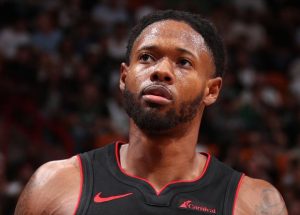Two of the NBA‘s most significant dynasties emerged in the second decade of the 2000s.
LeBron James teamed up with Dwyane Wade and Chris Bosh to form a Miami Heat super team that reached four straight finals, winning a pair of championships.
Then came the ascension of Steph Curry’s fling-it-up-from anywhere Golden State Warriors, who claimed three titles of their own and shredded all conventional wisdom on how far from the basket constituted a good shot.
There were also significant developments happening away from the court.
With James, Curry and others setting the tone, NBA players increasingly led a clarion call for social justice in the 2010s.
James and Wade posed in hoodies with their Miami teammates for a dramatic picture protesting the shooting death of Florida teenager Trayvon Martin.
Chris Paul and Jamal Crawford staged a silent protest that helped lead the NBA to issue a lifetime ban against Los Angeles Clippers owner Donald Sterling over racist comments that were caught on tape.
Players across the league donned “I Can’t Breathe” T-shirts — the last words of Eric Garner before his death after being placed in a chokehold by a New York City police officer.
The players of the WNBA also stepped up their activism, from wearing shirts that proclaimed “Black Lives Matter” to kneeling during the national anthem to show solidarity with Colin Kaepernick’s NFL campaign against police violence. They even campaigned against one of their owners in a U.S. Senate election.
“I will not just shut up and dribble,” James said, in what could very well be the mantra of the decade. “I mean too much to so many kids that feel like they don’t have a way out and they need someone to help lead them out of the situation they’re in.”
A decade of social activism merged seamlessly into America’s racial reckoning in the summer of 2020, which again found the NBA in the middle of things.
That shouldn’t have been a surprise, given the NBA has generally scored better than North America’s other men’s sports leagues on racial and gender equity issues.
As the decade ended and the world was struck by a new scourge — the COVID-19 pandemic — the players of the NBA and WNBA only grew louder.
The deaths of George Floyd, Breonna Taylor and Ahmaud Arbery led to massive protests not seen since the 1960s, a cause that both leagues embraced while completing their seasons in a bubble to cope with the deadly virus.
Not even the closed-off world at Disney could stifle the NBA’s rank-and-file.
When Jacob Blake, a Black man, was shot by police in Kenosha, Wisconsin, a Milwaukee Bucks-led protest prompted players to walk off the court in the middle of the playoffs — a movement that sparked similar protests in other sports and received widespread support from the NBA’s largely white coaches and owners.
The players have vowed to turn symbolic gestures of the past decade into real change in the years to come, tackling crucial issues such as voting rights in response to many states changing access to the election booth.
NBA arenas were transformed into massive voting precincts during the 2020 election, allowing citizens to cast their ballots in person while maintaining social distancing guidelines amid a raging pandemic that has killed millions around the globe.
If the players have their way, that’s only the start.
There’s so many things on their to-do list for the next decade.
“We need to back the words up with action,” Young said. “I hope the world feels the same way.”






